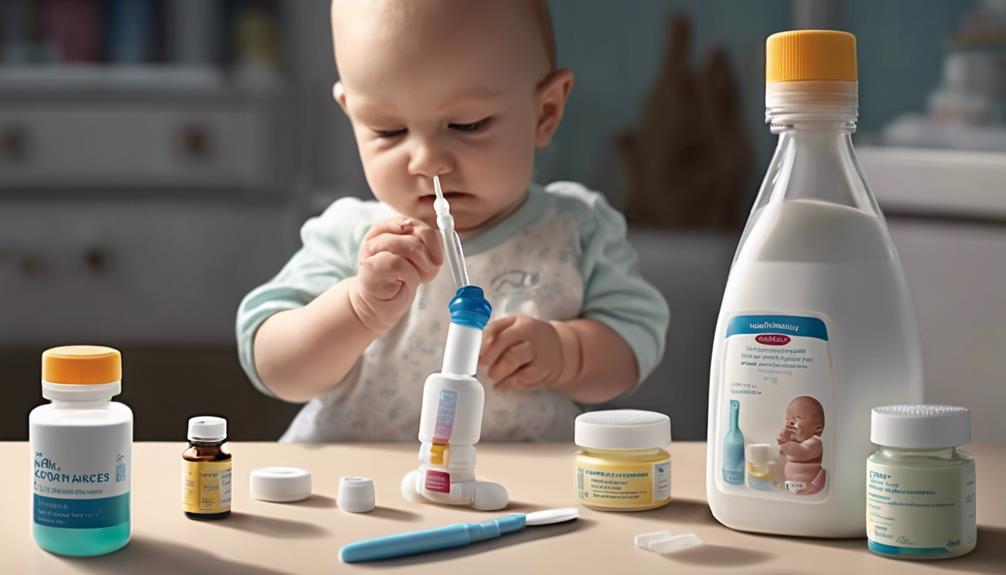We've all been there – the diaper change that feels more like a liquid explosion. Did you know that up to 70% of newborns experience diarrhea in their first few months of life? Managing liquid poop in newborns can be a challenging aspect of caring for these tiny humans.
But fear not, as we navigate through the intricacies of this common yet concerning issue, there are essential tips and strategies that can make a significant difference in your baby's health and well-being.
Let's explore together how to effectively handle this messy situation and guarantee your little one stays happy and healthy.
Key Takeaways
- Newborn liquid poop is common, influenced by diet and infections.
- Hygiene practices and diaper care prevent skin issues.
- Adjust feeding, offer fluids, and consider probiotics for treatment.
- Seek medical help for blood, mucus, fever, dehydration, or persistent symptoms.
Causes of Liquid Poop in Newborns
Liquid poop in newborns can arise from various factors related to their developing digestive systems and dietary intake. The delicate nature of a baby's gastrointestinal system, still maturing after birth, can lead to episodes of diarrhea, especially in breastfed infants. Breast milk, while excellent for babies, is easily digestible, sometimes resulting in more liquid poop.
On the other hand, formula-fed babies might experience liquid poop if they struggle with the formula or have underlying digestive issues. Infections, like gastroenteritis, or food intolerances can also trigger bouts of liquid poop in newborns, causing distress to both the baby and caregivers. Additionally, changes in the mother's diet or introducing new foods while breastfeeding can temporarily alter the baby's stool consistency.
Understanding these causes can help caregivers navigate and manage liquid poop episodes in newborns with patience and care.
Symptoms of Liquid Poop in Newborns
When newborns experience liquid poop, they may notice a change in the frequency and texture of their baby's bowel movements. Liquid poop in newborns is often yellow or green in color, which can be concerning for parents. It may have a seedy or curd-like texture, reflecting the immature digestive system of newborns.
This type of bowel movement is common, especially in breastfed babies, and can occur multiple times a day, which is considered normal in the first few weeks of life. Monitoring the frequency, color, and consistency of liquid poop in newborns is essential for tracking their digestive health.
While it may seem alarming, especially for first-time parents, understanding these symptoms can help ease concerns and provide reassurance that their baby's digestive system is developing as expected. Remember, staying informed and observant is key to ensuring your newborn's well-being during this period.
Prevention Strategies for Liquid Poop
To prevent skin irritation and diaper rash in newborns experiencing liquid poop, it's essential to maintain proper hygiene by thoroughly cleaning the baby's bottom after each bowel movement. Using gentle wipes or a soft cloth can help avoid further irritation from harsh materials.
Applying a protective diaper cream forms a moisture barrier, reducing the risk of diaper rash. Ensuring frequent diaper changes, at least 7-8 times a day, keeps the skin dry and healthy.
Opting for environmentally conscious diaper care products not only promotes sustainability but also reduces the environmental impact of diapering. By following these prevention strategies, caregivers can protect their newborns from skin irritation and discomfort associated with liquid poop, fostering a healthy and happy baby.
Treatment Options for Liquid Poop

Adjusting feeding schedules to smaller, more frequent feedings can be an effective treatment option for managing liquid poop in newborns. Making sure that your little one is adequately hydrated is important, so offering extra fluids such as breast milk or formula can help in rehydration. Additionally, using oral rehydration solutions (ORS) as directed by a healthcare provider can aid in restoring the electrolyte balance in newborns experiencing liquid poop. Probiotics, recommended by a doctor, can play a significant role in improving gut health by restoring the balance of good bacteria and enhancing stool consistency. However, in severe cases where liquid poop leads to dehydration, hospitalization for IV fluids may be necessary to ensure the baby's well-being. Monitoring your newborn closely and consulting a healthcare provider for the best course of action to address liquid poop effectively is crucial.
| Treatment Options | Description |
|---|---|
| Adjust feeding schedules | Smaller, more frequent feedings can help manage liquid poop. |
| Offer extra fluids | Providing breast milk or formula aids in rehydration for newborns with liquid poop. |
| Use oral rehydration solutions | ORS, as directed by a healthcare provider, can restore electrolyte balance in babies with liquid poop. |
When to Seek Medical Help for Liquid Poop
If you notice any concerning changes such as blood or mucus in your newborn's liquid poop, it's important to seek medical help promptly. Changes in your baby's stool color and consistency can be worrying, and it's vital to know when to reach out to your doctor for assistance. Here are some key signs that indicate the need for medical attention:
- Blood or Mucus: If you see blood or mucus in your newborn's liquid stools, contact your healthcare provider immediately.
- High Fever: Call your doctor if your baby's liquid poop is accompanied by a high fever, as this could signal an underlying issue.
- Signs of Dehydration: Immediate medical attention is crucial if your newborn shows signs of dehydration along with liquid poop. Keep an eye out for reduced urine output, dry mouth, or sunken fontanelles.
- Persistent Symptoms: Consult a healthcare professional if your baby's liquid poop persists for more than a few days, or if it's excessive and frequent. Your doctor can provide guidance on the best course of action to keep your baby healthy.
Frequently Asked Questions
What Should I Do if My Newborn Has Watery Poop?
If our newborn has watery poop, we must monitor for dehydration signs like reduced urine output or dry mouth. Seek medical help for alarming symptoms such as blood in stool or persistent diarrhea. Treatment may involve rehydration solutions and dietary changes.
What Is the Management for Watery Stool?
When dealing with watery stool in newborns, we focus on evaluating hydration levels and ensuring adequate fluid intake. Monitoring signs of dehydration, like decreased urine output, is important. Using oral rehydration solutions and adjusting feeding schedules can help manage this issue effectively.
How Do You Treat Diarrhea in Infants?
When treating infant diarrhea, we recommend rehydrating with oral solutions, avoiding anti-diarrheal meds without consulting a healthcare provider, adjusting feeding schedules, monitoring diaper changes for signs of dehydration, and seeking medical advice if symptoms persist.
What Formula Should I Use if My Baby Has Diarrhea?
When our baby has diarrhea, we choose a hydrolyzed or lactose-free formula to ease digestion. Probiotic formulas restore healthy gut bacteria. Consulting a healthcare provider for tailored advice is essential. Gradual changes and consistency are key.
Conclusion
So there you have it, folks! Managing liquid poop in newborns may not be glamorous, but with the right knowledge and care, you can tackle this messy situation head-on.
Remember, when it comes to dealing with those watery explosions, stay calm, stay informed, and most importantly, stay prepared.
With a little bit of patience and a whole lot of baby wipes, you'll be a liquid poop pro in no time!










